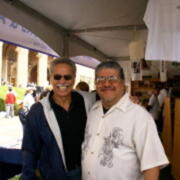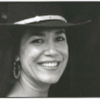Luis J. Rodriguez
Author of Always Running: La Vida Loca: Gang Days in L.A.
About the Author
Luis J. Rodriguez writes about race, culture, identity, and belonging and what these all mean and should mean (but often fail to) in the volatile climate of our nation. His passion and wisdom inspire us with the message that we must come together if we are to move forward. As he writes in the show more preface, "Like millions of Americans, I'm demanding a new vision, a qualitatively different direction, for this country. One for the shared well-being of everyone. One with beauty, healing, poetry, imagination, and truth." The pieces in From Our Land to Our Land capture that same fantastic energy and wisdom and will spark conversation and inspiration. show less
Image credit: Photo Courtesy of Gina Marysol Ruiz
Works by Luis J. Rodriguez
It Doesn't Have to Be This Way/No tiene que ser asi: A Barrio Story/Una historia del barrio (1999) 106 copies, 2 reviews
From Our Land to Our Land: Essays, Journeys, and Imaginings from a Native Xicanx Writer (2020) 10 copies, 1 review
Associated Works
From Totems to Hip-Hop: A Multicultural Anthology of Poetry Across the Americas 1900-2002 (2002) — Contributor — 174 copies
Currents from the Dancing River: Contemporary Latino Fiction, Nonfiction, and Poetry (1994) — Contributor — 51 copies
Send My Love and a Molotov Cocktail! Stories of Crime, Love, and Rebellion (2011) — Contributor — 34 copies
Latino Poetry: The Library of America Anthology (LOA #382) (Library of America, 382) (2024) — Contributor — 14 copies
Tagged
Common Knowledge
- Legal name
- Rodríguez, Luis Javier
- Birthdate
- 1954-07-09
- Gender
- male
- Nationality
- USA
- Places of residence
- East Los Angeles, California, USA
Chicago, Illinois, USA - Education
- California State University (1972-73)
Rio Hondo Community College
California Trade-Technical Institute
Watts Skills Center
Mexican-American Skills Center
East Los Angeles College (1978-79) (show all 8)
University of California, Berkeley (1980)
University of California, Los Angeles - Occupations
- school bus driver
lamp factory worker
truck driver
paper mill utility worker
millwright apprentice
steel mill worker (show all 19)
foundry worker
carpenter
chemical refinery mechanic (1972-79)
Eastern Group Publications, Los Angeles, CA
photographer and reporter (seven East Los Angeles weekly newspapers ∙ 1980)
reporter (for newspapers ∙ including San Bernadino Sun)
poet
novelist
journalist
critic
columnist
fiction writer
children's book writer - Organizations
- Tía Chucha Press
Tía Chucha's Centro Cultural & Bookstore - Awards and honors
- Lannan Literary Award (Poetry|1992)
Robert Kirsch Award (2021) - Agent
- Susan Bergholz Literary Services
Members
Reviews
Lists
Awards
You May Also Like
Associated Authors
Statistics
- Works
- 22
- Also by
- 16
- Members
- 1,539
- Popularity
- #16,726
- Rating
- 3.9
- Reviews
- 28
- ISBNs
- 65
- Languages
- 1
- Favorited
- 4
























Introduces his life (autobiography) of how he was involved in gangs at a young age, now he counsels those young people in those same bad steps, to advocate for those kids and create a community where people feel seen and cared for and value their lives.
Lived in the barrio with his family members close by, explained there’s some gang members who lived around and were always watching + people were afraid of them. He helped his uncle out while he was doing mechanic work. The gang member talked to him telling him to join and he thought “I’m glad he wants to be friends and not hurt me” even though he knew that Pee Wees did things that got him in trouble.
Made him sneak out and hang out with the guys at an empty lot, watching another guy get hurt. Then he started to dress differently and girls started respecting him while the teachers were starting to notice and become afraid.
He bought a knife because he was getting “jumped in” the next day and only his cousin knew about it.
“The next night I met Clever, Payaso, and the others at the wall. I wasn’t sure I wanted to be there but I didn’t know how to get out of it.”
Her cousin went to stop her and suddenly there were 3 gunshots. Everyone was fine except Dreamer and everyone except Clever left him alone with her bleeding. They heard sirens. After he ran home to not get in trouble.
“I never knew anything like this would happen. It was because of me that she got shot. She was only trying to take care of me.”
“But Tio Rogelio put his arm around me. It doesn’t have to be this way mijo he said. I know you want to be a man, but you have to decide what kind of man you want to be.”
Dreamer lived and he started helping his Tio fixing cars and shared his story to him about how he decided not to join the Pee Wees.
“We can make good things happen, mijo, if we all work together.” -Tio Rogelio… (more)